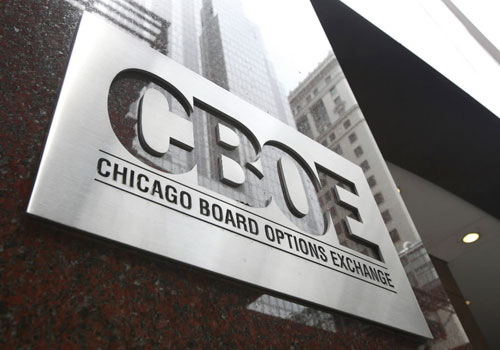FLASH FRIDAY is a weekly content series looking at the past, present and future of capital markets trading and technology. FLASH FRIDAY is sponsored by Instinet, a Nomura company.
Over the last years outsourced trading became mainstream with asset managers choosing the offering to enhance performance and efficiency as well as to manage their costs.

Interest is outsourcing has remained healthy, so it is hard to determine if recent trends such as rising levels of complexity, volatility, and market uncertainty, are having an impact on outsourced trading, said Grant Johnsey, Head of Integrated Trading Services (ITS) for the Americas at Northern Trust. “It seems that the trend towards outsourced trading has gained sufficient momentum that it is now growing independently of global macro events,” he added.
Nevertheless, Johnsey said that the widespread deployment of buy-side trading desks is a “relatively new phenomenon”. Today, markets are more efficient, investment required to maintain a trading desk is accelerating, margins are being compressed, and regulation changes have favored outsourcing models. “So, in effect, outsourced trading is enabling asset managers to pivot back to a period they were primarily focused on portfolio construction and raising capital,” he said.
Outsourcing conversations are also increasingly broad—asset managers are thinking about how to outsource more than just trading, he said. “We are also noticing increased interest in outsourcing parts of the investment process too,” he added.

Aaron Hantman, CEO of Tourmaline Partners, said that industry trends are driving demand for both outsourced and supplemental trading solutions. He said that over 40 firms now claim to be in the ‘outsourced space’, adding that the industry landscape has settled into three broad buckets: Sell-side prime brokers; Custodians; and Pure-play independents. ‘Others’ would include a handful of smaller shops, some European asset managers and some outliers in the form of rebranded sell-side execution desks, wrap/wealth management desks and the like, he explained.
Outsourcing models
Outsourced trading solutions can vary widely and be customized, across different providers and even within a single firm, noted Johnsey.
Solutions can range from completely outsourcing all trading and analysis, to on-demand items. Johnsey thinks the key question to ask [for asset managers considering outsourcing] is: “What is the optimal future state for our investment management business?” And from there, other questions and considerations will surely follow, he added.
Hantman said that the needs of each investment manager may differ, adding that the first question to consider is whether a manager is seeking to fully outsource or if it is seeking to supplement its reach. “Other questions to consider are the specific reasons for engaging external support,” he said.
He outlined typical needs (use cases) for a manager that may include:
- Expanding reach to liquidity information, color and research
- Helping with small cap / closely held / illiquid names
- Trading offshore markets
- Addressing bandwidth issues
- Gaining expertise / access to greater high- and low-touch trading solutions
- Anonymity – helping to reduce information leakage

According to Shane Swanson, Research Director at Coalition Greenwich, the growth of using outsourced trading firms to supplement an institutions own trading desk, whether to access additional skills, expertise, market color, or depth of bench, is “a trend on the rise”.
Every manager has to determine its own needs, but outsourced trading can help firms reach different markets or access more asset classes than their internal desk, he said.
Moreover, institutions have been looking for ways to help supplement their own efforts may find outsourced desks to be a viable solution, he added.
Jeff LeVeen, Managing Director, Global Head of Outsourced Trading and Co-Head of Prime Services at Jones Trading, agreed, saying there is definitely more redundancy for internal trading desks.“I think even your biggest firms are engaging outsourced trading to some degree,” he said.
Johnsey added that the emergence of different outsourcing models, tailored to the needs of the asset manager, is still a meaningful trend. “As the asset management industry has embraced outsourcing of some or all of the their trading activities, the solutions available naturally continue to evolve and develop,” he said.
Benefits & Risks
Outsourced trading provides investment managers a cost-effective solution for running their business, while providing direct access to liquidity and market intelligence, LeVeen said.

However, it’s not volatility that drives the demand for outsourcing, he said, adding that the demand for outsourced trading was always there.
If asset managers outsource, they don’t have to pay an internal trader, that frees up resources on their management fee, he explained.
LeVeen thinks that cost isn’t the leading benefit for outsourcing: “I think the benefit is honestly scale.”
He added that fund managers are missing the trading flows, the market color, and the research from outsourcing firms. “They have a constricted budget, they only have a number of brokers they can work through.”
According to LeVeen, the execution and expertise matter. “That’s why we’ve taken our time to scale this business appropriately and put the right people in the right seats with the right backgrounds so that we can win these opportunities.”
For Tourmaline’s Hantman, scale, reach and a global footprint are of significant importance when sourcing liquidity, information, color and news. “While there may be economic benefits to outsourced and supplemental trading, we believe the core mission should be to improve workflow and the ability to achieve best execution. This includes expanding a firm’s reach to liquidity, information, color and research,” he said. The risk to any investment manager would be engaging a firm that cannot provide the above, he said, adding that no manager should compromise best execution when seeking to reduce costs.
According to Swanson, the scope and scale of the outsourced firm are top considerations, as well as the coverage model that they provide.
He said that on the benefit side, asset managers can gain access to more markets and asset classes, deeper pools of liquidity and resources, as well as supplemental trading to support their own efforts.
“On the risk side, the standard rules of vendor engagement apply, with the added need to ensure that your provider is achieving best execution results on your orders,” he said.
The primary benefit of outsourcing is that it allows for the asset manager to focus on those functions and activities that genuinely generate alpha or improve their distribution capability, commented Northern Trust’s Johnsey. Outsourcing trading offers defensive benefits that are well understood, such as cost savings, workflow efficiencies, trade error reduction, and improved business resiliency.
“Outsourced trading also can bring greater depth and breadth of expertise to an investment manager, along with increased resources and better scalability, especially as AUM ebbs and flows,” he said.
Risks of outsourcing include the potential for errors during the process of pivoting to the outsourcing model, and the selection of your outsourcing partner, he added.
According to LeVeen, the big risk is information leakage. “There are many firms that have their outsourced trading business 10 feet away from their other businesses. “If I’m a client, I’d want fewer eyes seeing my orders. I want my trader and that’s it. I don’t need an entire sales team that has visibility on what I’m doing,” he said.
LeVeen said there’s a lot of information that a client exposes to a broker dealer. “I would want to engage myself with a firm that I know is aligned with my best interest and isn’t taking proprietary positions around my orders or other clients’ worth,” he commented.
Overall, he thinks the risks are greater for managers that are not engaging outsourced trading.
Johnsey said that there’s a realization that outsourcing enhances cost-contained growth, adding that there is also a growing realization that outsourcing can be a force multiplier, by using the capabilities, resources and network effects available through the outsourced trading desk.
“Trading is after all a scale business, and asset managers are realizing as the pace of change quickens that there is a real benefit to leveraging a larger trading operation,” he concluded





